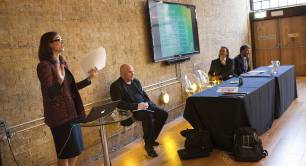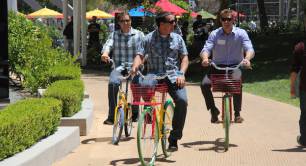Liquidised: cash and growth issues claim foodies’ favourite social enterprise

The chairman of an ambitious social enterprise that ran the UK’s ethical restaurant of the year has spoken of the challenges of growth and investment – after the business went into liquidation.
The Create Foundation’s Leeds restaurant, staffed by vulnerable young people under the tuition of a former Harvey Nichols executive chef, won plaudits from critics and was named the Observer Food Monthly’s ethical restaurant of the year 2012. The enterprise was also the RBS SE100 Trailblazing Newcomer 2010 and a Big Society Award winner.
The prime minister David Cameron called it ‘a proud example of the Big Society I want to see across the UK’.
In spite of these accolades, a one-time turnover of £1.5m and big plans to ‘make Create a high street name’, the community interest company went into voluntary liquidation on 5 June.
Chairman Norman Pickavance, a former Morrisons Group HR and communications director, told Pioneers Post that, in common with many others in the sector, growing the organisation was its biggest challenge.
‘Very few social enterprises have scaled up,’ he said. ‘We were looking to do that and expanded in the belief that we would attract the funding we needed. We attracted some funding but not all the funding we needed to support the growth and, like many businesses trying to expand, we had cashflow challenges because the funding didn’t come through.’
Attempts to broaden the organisation’s income by getting involved in the government’s Work Programme failed, said Pickavance. The bureaucracy proved to be ‘too tortuous and difficult for an organisation of our size’, he said. The money also took too long to come through.
Create also launched an enterprise investment scheme which didn’t secure enough backing to continue as planned.
The Create Foundation was founded in 2007 to help homeless and other vulnerable people back into work. The organisation experimented with various training grounds including a cleaning company, a vintage clothing boutique, event management and a catering business. It became best known for its flagship restaurant in Leeds.
In 2010 the enterprise’s ‘combination of rapid but sustainable growth, effective social impact measurement and far-reaching ambition’ impressed the judges of the RBS SE100 awards enough to see it named that year’s 'trailblazing newcomer’.
At the time it claimed a social return of £7.12 for every £1 invested.
After it opened its Leeds restaurant, co-founder and chief executive Sarah Dunwell said that it aimed to launch similar restaurants in three other cities in northern England. She added: ‘In the next three years we want to make Create a high street name.’
But Dunwell’s blog in November 2012 revealed that these ambitions weren’t being realised. She wrote: ‘It has been the hardest month since I founded the business five years ago. Cashflow challenges, HR barriers, testing relationships with external partners and investors, tough conversations with the board, and a pressurised senior team who have sometimes snapped at each other… A kind of 360 degree bummer.’
The fact that much of Create’s turnover came from trading (83 per cent in 2010), highlights what could have become its weakness. By February 2013, financial pressures had forced the restaurant to close.
In a statement after the restaurant shut, Create said: ‘We are not a charity. As a social enterprise, we pay the same commercial rents as any other restaurant chain and have had higher costs because of the extra support work we do. So in today’s harsh economy we have had to look really hard at how we can continue helping the maximum number of people whilst dealing with some tough commercial realities.’
In March, chief executive Sarah Dunwell and the entire board stepped down, handing the business over to Elmfield Training boss Ged Syddall, who had been a non-executive director for a year and who had already invested money in the business. Syddall planned to reopen the restaurant as a community learning hub. At the time, Pickavance said: ‘The plan is a lifeline and the best chance Create has to keep going.’
Create’s latest accounts reportedly showed a deficit of nearly £1m. It is currently in voluntary liquidation with Insolvency Practitioners Direct.
Despite Create’s failure, Mr Pickavance emphasised that he was proud of its achievements. ‘We helped over 500 people from homeless and excluded backgrounds into work and ran an award-winning restaurant. More than 60 per cent of people went into employment who had been through the programme. We had a super social return on investment. A lot of lessons have been learned. I passionately believe in what the sector is about and I am keen to continue my work in it.’
Norman Pickavance will be talking to Pioneers Post later this summer about the lessons learned from his experience with Create.
Pioneers Post has attempted to contact Ged Syddall but as yet has had no response.


